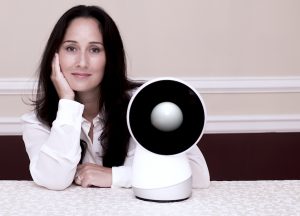Cynthia Breazeal is a scientist and roboticist. She is a pioneer of the world’s first social robot.
Cynthia’s approach to innovation helped her develop social robots that improve the quality of people’s lives. She is an inspiration to anyone who wants to use technology that will benefit the health, communication, creativity and educational goals.
Cynthia, born in New Mexico, received her B.S. in Electrical and Computer Engineering from the University of California, in 1989, her M.S. in 1993, and her Sc.D. in 2000 in Electrical Engineering and Computer Science, both from MIT.

Cynthia's Research
Her research focuses on developing the principles, techniques, and technologies for personal robots. These robots are socially intelligent, interact and communicate with people in human-centric terms, work with humans as peers, and learn from people as an apprentice. She has developed some of the world’s most famous robotic creatures. These range from small hexapod robots, to embedding robotic technologies into familiar everyday artefacts, to creating highly expressive humanoid robots and robot characters. Her recent work investigates the impact of social robots on helping people of all ages to achieve personal goals that contribute to quality of life in domains such as physical performance, learning/education, health, and family communication + play over distance.
Cynthia's Awards and Recognitions
Dr. Breazeal is a recipient of the National Academy of Engineering’s Gilbreth Lecture Award and an ONR Young Investigator Award. She has received Technology Review’s TR100/35 Award, TIME magazine’s Best Inventions of 2008, and has been honoured as finalist in the National Design Awards in Communication. In 2014 she was recognised as an entrepreneur as Fortune Magazine’s Most Promising Women Entrepreneurs, and she was also a recipient of the L’Oréal USA Women in Digital NEXT Generation Award. The same year, she received the 2014 George R. Stibitz Computer & Communications Pioneer Award for seminal contributions to the development of Social Robotics and Human Robot Interaction.
Dr. Breazeal has given some great advice for women in the past:
"I work with a lot of incredibly talented women at MIT and Jibo and throughout my life, it always amazes me how women somehow just make it all work...I gave a commencement speech [at an] all girls academy, and I said to be an extraordinary woman doesn't mean you have to be superwoman...it's about knowing when you need help, asking for help, being there for others when they need help, growing these support networks.
"As moms we often put ourselves last on the list, everyone else comes first. We need to appreciate that we need to be able for other people, then we need to be there for ourselves. [But] somehow women, we just make it work. Don't worry, you will figure it out."
Women in STEM
Women currently make up just 24% of all people employed in STEM industries. A key area for concern is the huge drop-off in the number of girls studying core STEM subjects at the age of 16.
It is recognised that, in order to get a better gender balance in an area, you need to inspire children from a very young age. There is a need to profile role models so children – or young women – who are thinking about a career in STEM, will think, ‘Look at what these women have done… I can do this, too.
Cynthia Breazeal is a great example of one of these inspiring women.
With our growing rang of STEM Education products, including the
LEGO® Education range, we are helping inspire all children and young adults to consider a career in STEM.


